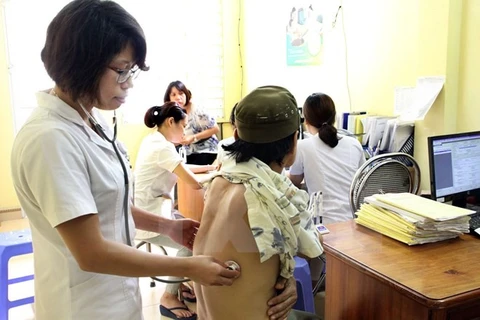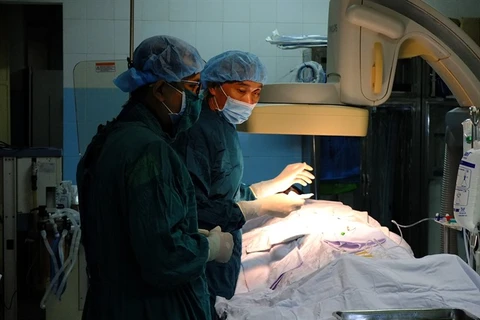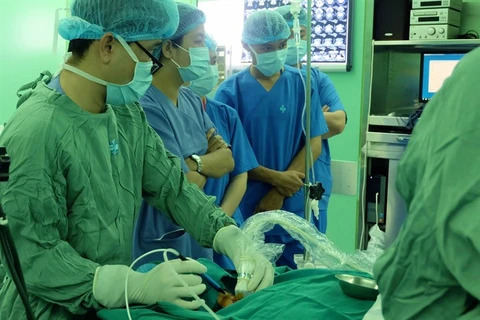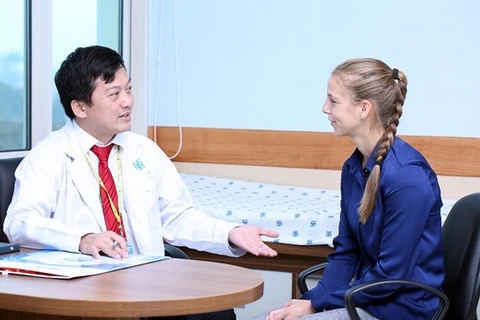 A foreign patient receives treatment at the Hanoi-based Vietnam-Germany Friendship Hospital (Photo: VietnamPlus)
A foreign patient receives treatment at the Hanoi-based Vietnam-Germany Friendship Hospital (Photo: VietnamPlus) Hanoi (VNA) – In 2014, more than 234,000 foreigners sought medical examination in Vietnam’s health facilities, with 26,000 inpatients. Four years later, the number rose to over 300,000.
At present, the application of high technology in medical treatment has seen successful results as many difficult illnesses were cured.
Recently, a billionaire from Taiwan fell ill when taking a vacation in Vietnam. Doctors at the Vietnam-Germany Friendship Hospital successfully performed his surgery.
Upon his return, he presented 100,000 USD to the hospital so that it could afford to send doctors to Taiwan to study organ transplantation.
Director of the hospital, Prof. Tran Binh Giang, shared information on medical examination and treatment for foreigners in an interview with VietnamPlus.
Reporter: What are current difficulties and advantages in providing medical treatment and examination for foreigners?
Prof. Tran Binh Giang: With the renewal and open policy of the Party and State, more foreigners have come to work in Vietnam.
In addition, foreign tourist arrivals have been on the rise, resulting in increasing demand for health care. Therefore, the health sector has to strive to meet patients’ needs.
Firstly, we have to work so that foreigners will stay in Vietnam for medical treatment. As communication work has yet to be efficient, foreigners working in representative offices or tourists in the country who face an accident often seek international S.O.S services to go to other countries, particularly regional ones like Singapore. In fact, Vietnamese doctors are capable of providing such treatment.
Secondly, major hospitals in Hanoi and Ho Chi Minh City have launched departments for foreign patients but it remains unsystematic. For instance, hospitals in HCM City mainly receive patients from Cambodia while those in Hanoi mostly receive Lao patients.
Reporter: Medical experts at the hospital have recently cured many foreign patients, could you share some noteworthy cases?
Prof Tran Binh Giang: Not so long ago, a 15-year-old girl from Ukraine travelled to Vietnam to visit her relatives. She suffered constant vomiting. Following medical examination, she was found to have a psychiatric disorder called trichophagia, as she has an irresistible urge to swallow her hair. The hair in her stomach could not be digested so it caused an obstruction in her bowel.
After hospitalisation, she went through an endoscopic surgery and her bowel was recovered.
We also successfully removed stones in the gallbladder and a renal cyst for a Qatari Ambassador to Vietnam.
Reporter:Have there been any Vietnamese who had to return to the hospital for re-treatment after treatment in foreign countries?
Prof. Tran Binh Giang: Doctors at the hospital recently performed a surgery on a female patient who previously sought medical treatment abroad. She went through a hysterectomy surgery and handled her placenta praevia in Singapore, costing 50,000 USD, but there was a side-effect.
Returning to Vietnam, she received a surgery at the hospital at a cost of just about 17 million VND (730 USD), while it would have been 60,000 USD if in Singapore.
Reporter: To make more foreigners seek treatment in Vietnamese hospitals, what adjustments should we make?
Prof. Tran Binh Giang: The Vietnam-Germany Friendship Hospital is striving to remove bottlenecks to turn into a health facility of international calibre, attracting more overseas Vietnamese and foreigners who choose to stay in the country for treatment.
In the coming time, we will collaborate with insurance companies to introduce our health services to international patients.
The hospital is working to build its department for foreign patients with about 200 beds and purchase modern equipment.
Administrative procedures should be streamlined to reduce overloading which makes patients hesitant to go the hospital.
Thank you for the interview./.
























